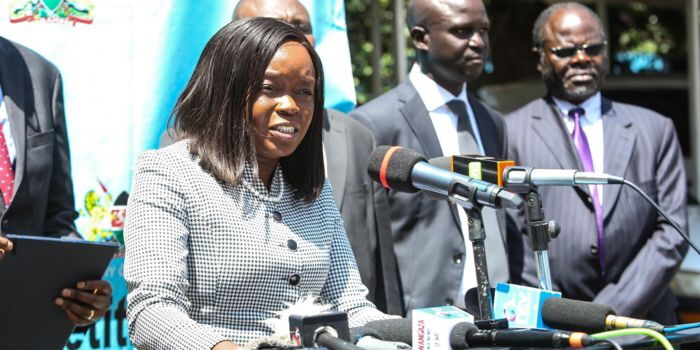Kenya will be integrating HIV and TB management into routine healthcare services, moving away from treating them as standalone programmes, as part of the stop-gap measures to aid Kenyans who were dependent on USAID to receive treatment.
The US government, through the President’s Emergency Plan for AIDS Relief (PEPFAR) and the United States Agency for International Development (USAID), has been supporting various efforts, including medical research, the treatment of Tuberculosis (TB), HIV, and AIDS, as well as malaria.
Over the last 40 years, the US government has been supporting treatment that has reached 3.7 million Kenyans with HIV medications, according to the Ministry of Health.
While addressing the press at Afya House on Wednesday, Health Cabinet Secretary Deborah Barasa dismissed calls for alarm over the withdrawal of US funding that has been supporting various treatment and research activities in the country.
US President Donald Trump signing an Executive Order in the Oval Office, January 20, 2025.
Photo
White House
According to the CS, the government will be relying on the new health system Taifa Care through the Social Health Authority (SHA) to plug the holes left by the USAID. The government will also rely on the exchequer for more funding to keep the programmes like research running while searching for more donors to replace USAID.
“At this juncture, I believe that it is critical for us to think of sustainable solutions and domestic health financing. And part of it is through TAIFA care, and that is through the Social Health Authority, where we will be having funding from the Social Health Insurance to ensure that we are also looking into the concerns of HIV, TB cases, and also patients who have malaria or other forms of support that the US government has been offering,” CS Barasa said.
While the move to integrate the treatment is not new, it has received new impetus after the decision by US President Donald Trump to suspend foreign aid for three months.
The government has been exploring ways of integrating the treatment of HIV and TB in hospitals since last year. In July 2024, the Ministry of Health established a team to strategise on integrating HIV prevention, care, treatment, and support into primary healthcare.
Already, thousands of employees of United States government-funded health projects and programmes in Kenya are staring at forced unpaid leave and possible layoffs following Trump’s order freezing aid.
As many as 35,000 Kenyan workers linked to the Pepfar programme face uncertainty following the directive.
An assessment by the Andelson Office of Public Policy reveals that those affected include 1,952 doctors and clinical officers, 1,234 nurses and midwives, 578 laboratory professionals, over 340 pharmacists, and more than 24,577 community health workers.
The Andelson Office, a policy division of amfAR—The Foundation for AIDS Research—advocates for global policy reforms on HIV/AIDS research, prevention, and treatment.
Health Cabinet Secretary Deborah Barasa, with Kenyatta National Hospital CEO Dr Evanson Kamuri, interacting with a mother at the hospital, January 16, 2025.
Photo
MoH


